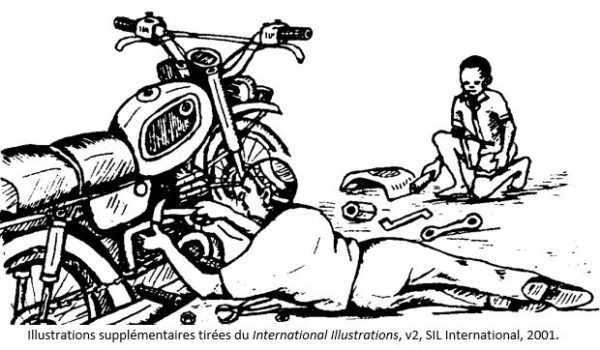
Sometimes it’s hard to explain what a linguist actually does. I mean, we work with languages. And everybody uses language to some extent or another. So how is being a linguist actually like a real job and anything more than what everyone else does? That’s what I often wonder. And then I heard a really good comparison that I think you’ll like, too: A linguist is like a mechanic, only what gets “broken” isn’t a motorized vehicle but the way that language is used. Linguists are especially important when you’re trying to do something with a language that’s never been done before (like create an alphabet) or translate from one language to another. See how it’s similar to a mechanic:
You see, lots of people have cars (or motorcycles).
You see, lots of people use language (whether spoken or signed).
And we can drive them, most of the time without a problem.
And we can speak them well, most of the time without a problem.
But sometimes something happens and it starts making some kind of weird noise or acting in a weird kind of way.
But sometimes something happens and the way we talk (especially a foreign language) just doesn’t sound right or the way something is translated feels wrong but we don’t know how to fix it.
It quickly gets over our heads and we need to head to the mechanic to try to get it fixed.
It quickly gets over our heads and we need to head to a linguist to figure out what’s going on.
What does the mechanic do?
What does the linguist do?
He asks a few questions.
She asks a few questions.
He looks under the hood.
She asks for example sentences from a native speaker.
And he may even take it for a spin.
And she may even look at in its larger context, like in a story.
By that time he often knows both what is wrong and how to fix it; if it wasn’t too bad, you have your car back in good working order quickly.
By that time, she often knows both where the trouble spot was and how to fix it; it wasn’t too tricky, she can help you understand or discover the workings of the tricky construction, and you can be back on your way to fluency or good translation quickly.
Sometimes, though, what he thought was wrong really wasn’t the problem, but he’ll try something, then have to try something else, and sometimes even a third thing before he gets it right and you car is working again.
Sometimes, though, what she thought was going on really didn’t explain all the ways this piece of language worked, but she’ll try something, then have to try something else, and sometimes even a third thing before she gets to the root of the language challenge and you’re back on your way to fluency or good translation.
You drive off and, after checking that it works, you don’t think much about it again until another problem comes up.
You start to use what you’ve learned and, after checking that it works, you don’t think much about it again until you run into another language difficulty.
(Ok, I know I’m simplifying some, but just go with it. It’s good for the illustration.)
(Ok, I know that I’m still simplifying, but I hope it helps you get the point of the illustration.)
So there you go. The next time someone asks you what a linguist does, you can tell them that they’re basically a mechanic for language. And just as I think that mechanics can be specialists, either in a type of car like Toyotas or a type of problem like radiators, a linguist can be a specialist either in a language or family of languages like Jula or languages of West Africa, or in a domain like alphabet-creation or verb conjugations.
But for me, the big difference between linguistics and mechanics is that being a linguist is a whole lot more fun! And I’ve both enjoyed and been challenged by working with challenges in different languages and different domains these last few months. Thanks for being an integral part of me being able to “play with languages” and be a blessing to others in this way!
excellent illustration and comparison– well done!